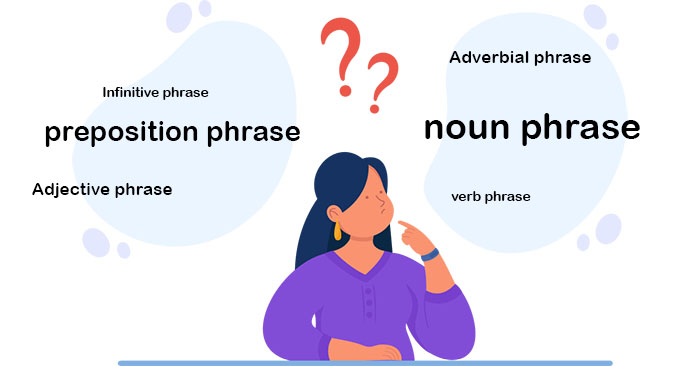Phrases with Examples

Table of Contents
What Is a Phrase?
A phrase is a group of words that can form a single grammatical unit, that is a unit that takes part in a sentence or a clause.
Let me explain; Unlike a clause that takes a subject and a verb, a phrase does not. Therefore, it cannot have a clear complete thought or idea.
The following examples show the difference between a phrase, a clause, and a single word:
Example (1)
- Clause – Let’s find a table that gets the sunlight.
- Phrase – Let’s find a table in the sun.
- Word – Let’s find a sunny table.
Example (2)
- Clause – Show Jane your project when she arrives.
- Phrase – Show Jane your project in the morning.
- Word – Show Jane your project tomorrow.
Still, confused?
Let’s try a sentence with no phrase and then construct them to have one.
- Sam eats cookies daily.
So, in this example, the sentence doesn’t have any phrases, because all parts stand on their own as a single word.
- My uncle Sam eats cookies daily.
Now the sentence contains a phrase, it has three words that function as the subject of the sentence. Notice that phrase has no verb or a subject.
- My uncle Sam eats cookies during the week.
Now a new phrase has been added to the sentence, it similarly has three words, but it functions as an adverb.
- My uncle Sam was eating cookies during the week.
We have added a new one, this time it is a two-word phrase that functions as a verb.
- My uncle Sam was eating chocolate cookies from the bakery during the week.
Now the phrase that we have added has five words and it functions as a direct object in this sentence.
If you make it this far, then you have learned that:
- A phrase is a group of words.
- A phrase functions as a single grammatical unit inside a sentence.
- A phrase does not convey any complete meaning as they don’t contain a verb and a subject.
Types of phrases with examples:
| Phrase type | Description | Example |
|---|---|---|
| Adjective phrase | A group of words headed by an adjective that changes a noun in a sentence. | Victoria was extremely proud of us. The adjective phrase changes the noun “Victoria” |
| Adverbial phrase | A group of words that functions as an adverb Which modifies the verb. | Luckily for us, we arrived just in time. The adverbial phrase changes the verb “arrived” |
| Noun phrase | A noun phrase is a group of words headed by a noun and its modifiers (e.g., the, a, of them, with her) | Singing in the bath relaxes me. The noun phrase here functions as the subject of the verb “relaxes” |
| Preposition phrase | A proposition phrase is a group of words headed by a proposition. | I live near the beach. Here the preposition phrase function as an adverb of place. |
| Infinitive phrase | An infinitive phrase is the infinitive form of a verb in addition to a compliment and modifier | She asks me to dance like no one is watching. |